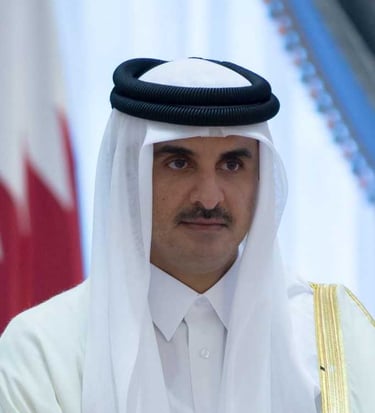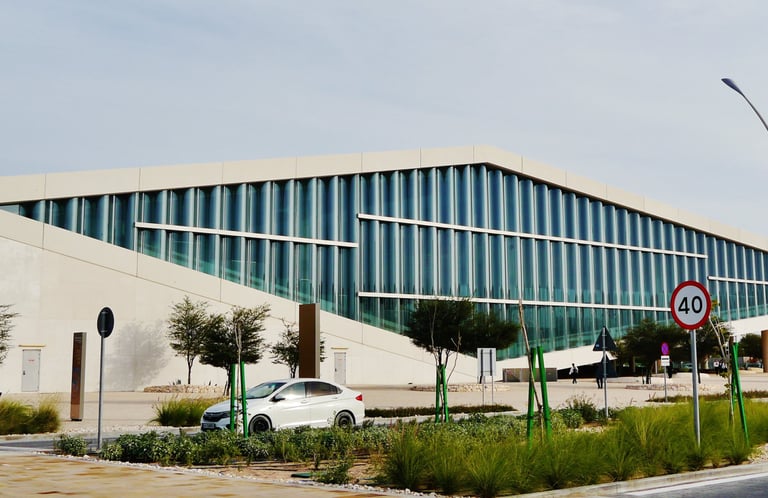REGISTRATIONS OPEN - ONLINE IGCSE O/A LEVEL CLASSES FOR MAY 2026 EXAMS
Sheikh Tamim and Qatar’s Education Revolution: Strategy, Impact & Vision 2030
Under Sheikh Tamim bin Hamad Al Thani’s leadership, Qatar’s “Igniting the Spark of Learning” strategy (2024-2030) is transforming education by expanding early childhood access, boosting STEM, inclusivity, teacher development, and aligning investment with Qatar National Vision 2030.
Abdullah Nabi Yusufi
10/7/20257 min read


Sheikh Tamim’s Vision for Education: Qatar’s Journey of Transformation
From the moment Sheikh Tamim bin Hamad Al Thani assumed the reins of leadership, education has been central in Qatar’s roadmap toward national prosperity. His conviction is that a country’s greatest strength lies not only in its wealth of resources, but in the minds, character, and skills of its people. The policies, speeches, and budget allocations under his rule prove that in Qatar, quality education is not optional but it is foundational to the Qatar National Vision 2030.
Key Speeches & Foundational Messages
Sheikh Tamim’s rhetoric repeatedly underlines education’s moral, social, and economic dimensions:
In a celebrated address to the 48th session of the Shura Council, he asserted that “man is the pillar of any renaissance.” He emphasized that while infrastructure may be impressive, what shapes lasting progress are the schools, the universities, the values, and the morality nurtured within society.
During the 140th Assembly of the Inter-Parliamentary Union (IPU), Sheikh Tamim framed education as “one of the most important elements of building the economy, advancing societies, and achieving growth and prosperity.” He linked education to dignity, social justice, and peace, asserting it’s both a human right and a key to sustainable societal development.
These are not empty speeches. The government has followed through: every major address has been paired with concrete policy measures, strategic documents, and funding decisions aligned with the vision.
Turning Vision into Strategy: “Igniting the Spark of Learning” (2024-2030)
In September 2024, Qatar’s Ministry of Education and Higher Education (MOEHE) launched its flagship strategy “Igniting the Spark of Learning,” under the slogan to empower learners for a sustainable future.
Objectives & Pillars
This ambitious strategy builds on the Third National Development Strategy (NDS-3) and QNV 2030. It covers all levels of learning, from early childhood to higher education and vocational training.
Key pillars include:
Early childhood (pre-primary)
Current pre-primary enrollment is about 44%. The goal is to double this figure by 2030.
Implementing regulatory changes: public schooling will begin at age three, expanding public and private nurseries and kindergartens.
Primary & Secondary Education
Emphasis on holistic education: values, character, ethical conduct, positive behavior, national identity.
Integration of digital pedagogies and personalized learning pathways.
Higher, Vocational & Technical Education
Diversify tertiary education and strengthen its attractiveness to Qatari students.
Expand STEM education: four new STEM schools by 2026 with capacity for over 2,000 students.
Lifelong Learning & Teacher Development
Continuous professional development for educators and improvements in academic supervision.
Foster a learning environment resilient to future challenges.
Inclusivity & Special Support
Establish support centres for students with disabilities.
Adjust educational vouchers for greater options for special needs students.
Recent Data & Indicators: Evidence of Change
To understand how far Qatar has come, recent statistics reveal measurable shifts in enrolment, infrastructure, and investment:
Growth in Student Numbers
The number of students in Qatar is expected to increase by over 48,000 by 2029, rising from about 430,000 in 2024 to nearly 480,000.Gross Enrolment Ratio (GER) Trends
Tertiary education GER projected to rise from 38.6% in 2024 to 41.1% by 2029.
Pre-primary GER to reach 51.3% by 2029.
Infrastructure & School Development
Construction of 14 new schools through public-private partnerships (PPP) expected to be operational by the 2025-26 academic year, serving over 10,000 students.
New buildings for the College of Dentistry and the College of Nursing being planned.
Budget & Spending Trends
In 2025, Qatar allocated USD 5.3 billion to education about 9.2% of the total government expenditure.
Public spending on education has hovered around 9-10% of government expenditure in recent years.
Why Sheikh Tamim’s Approach Matters More Than Ever
In a time of unprecedented global change—economic disruption, technological leaps, and evolving societal norms—Sheikh Tamim’s leadership in education is especially vital. His approach is not just timely; it is visionary, compassionate, and deeply inspiring. What he is doing matters for reasons that go beyond policy alone:
Elevating Excellence, Inspiring Dedication
Sheikh Tamim doesn’t merely set goals; he celebrates achievement. Under his patronage, the Education Excellence Day ceremonies have grown into powerful symbols of national pride. By honorably recognizing hundreds of students, teachers, researchers, and schools ranging from primary level to PhD holders, he reinforces a culture in which academic effort, ethical conduct, and creativity are valued.
On February 23, 2025, he honored 80 winners in the 18th Education Excellence Day Awards under the theme “With Excellence, We Build Generations,” reminding everyone that excellence builds the very foundation of future generations.Empowering Every Student, Supporting Every Teacher
His leadership underscores that education is not a competition of the few, but an inclusive journey. From outstanding students to special-needs learners, from early childhood to higher degree scholars, Sheikh Tamim’s policies and public engagements show that no one is to be left behind. Teachers, too, are elevated, not simply as deliverers of curriculum but as mentors, role models, nurturers of values. His praise for teachers and calls for their continuous development send a strong message that their work is seen, valued, and essential.Fostering National Pride and Unity
By linking educational achievement with national values, morality, ethics, citizenship. Sheikh Tamim helps cultivate a sense that every Qatari has a stake in the country’s future. Campuses, classrooms, even award ceremonies become spaces of unity, symbols of what collective effort can achieve. When he congratulates high school stars or PhD researchers, he isn’t merely acknowledging individual success, he’s affirming a shared sense of identity, responsibility, and aspiration.Leadership that Matches Words with Deeds
Many leaders talk about education. Very few back their talk with measurable investment, structural reforms, and inclusivity initiatives. Sheikh Tamim does all of the above—he ensures budgets reflect priorities, strategies are ambitious, and access is widened. The repeated alignment of speeches, strategies like the Education Strategy 2024-2030, and national development plans show his governance is consistent and dependable. It’s the kind of leadership that transforms expectations into realities.Preparing for the Future
In years to come, the world will demand not just degrees, but adaptability, digital skills, ethical leadership, creativity, and the ability to solve complex problems. Sheikh Tamim’s approach ensures Qatar is not playing catch up, it is trying to lead. Whether through STEM expansion, inclusion of special education, early childhood learning, or modern pedagogies, he is equipping young people for global challenges.
Why Sheikh Tamim’s Approach Matters More Than Ever
In a time of unprecedented global change, economic disruption, technological leaps, and evolving societal norms. Sheikh Tamim’s leadership in education is especially vital. His approach is not just timely; it is visionary, compassionate, and deeply inspiring. What he is doing matters for reasons that go beyond policy alone:
Elevating Excellence, Inspiring Dedication
Sheikh Tamim doesn’t merely set goals; he celebrates achievement. Under his patronage, the Education Excellence Day ceremonies have grown into powerful symbols of national pride. By honorably recognizing hundreds of students, teachers, researchers, and schools ranging from primary level to PhD holders, he reinforces a culture in which academic effort, ethical conduct, and creativity are valued.
On February 23, 2025, he honored 80 winners in the 18th Education Excellence Day Awards under the theme “With Excellence, We Build Generations,” reminding everyone that excellence builds the very foundation of future generations.Empowering Every Student, Supporting Every Teacher
His leadership underscores that education is not a competition of the few, but an inclusive journey. From outstanding students to special-needs learners, from early childhood to higher degree scholars, Sheikh Tamim’s policies and public engagements show that no one is to be left behind. Teachers, too, are elevated not simply as deliverers of curriculum but as mentors, role models, nurturers of values. His praise for teachers and calls for their continuous development send a strong message that their work is seen, valued, and essential.Fostering National Pride and Unity
By linking educational achievement with national values, morality, ethics, citizenship. Sheikh Tamim helps cultivate a sense that every Qatari has a stake in the country’s future. Campuses, classrooms, even award ceremonies become spaces of unity, symbols of what collective effort can achieve. When he congratulates high school stars or PhD researchers, he isn’t merely acknowledging individual success, he’s affirming a shared sense of identity, responsibility, and aspiration.Leadership that Matches Words with Deeds
Many leaders talk about education. Very few back their talk with measurable investment, structural reforms, and inclusivity initiatives. Sheikh Tamim does all of the above, he ensures budgets reflect priorities, strategies are ambitious, and access is widened. The repeated alignment of speeches, strategies like the Education Strategy 2024-2030, and national development plans show his governance is consistent and dependable. It’s the kind of leadership that transforms expectations into realities.Preparing for the Future
In years to come, the world will demand not just degrees, but adaptability, digital skills, ethical leadership, creativity, and the ability to solve complex problems. Sheikh Tamim’s approach ensures Qatar is not playing catch up it is trying to lead. Whether through STEM expansion, inclusion of special education, early childhood learning, or modern pedagogies, he is equipping young people for global challenges.
In sum, Sheikh Tamim’s leadership in education matters because it is earnest, because it is broad (everyone benefits), because it blends values with innovation, and because it moves beyond rhetoric to real change. For Qatar and its citizens, there is no more important president than the one with vision, heart, and resolve.
Conclusion: Honoring a Legacy of Educational Transformation
Sheikh Tamim bin Hamad Al Thani has done more than talk about a future built on knowledge he has actively built it. His steady leadership over the years has borne fruit in schools built, students empowered, teachers uplifted, and dreams made possible. Under his patronage, education in Qatar isn’t just a policy domain it is a beacon of national identity, hope, and progress.
We honor him for:
His unwavering commitment to excellence, recognizing achievement at every level and reminding citizens that success is celebrated by the highest office in the land.
His insistence on inclusivity, ensuring all Qataris regardless of age, ability, or background have access to education that nurtures both mind and character.
His foresight in aligning the nation's education with the demands of tomorrow, preparing students not just for jobs, but for leadership in a fast-changing world.
Sheikh Tamim’s work stands as a testament to what is possible when a leader sees people as the most precious resource. For Qatar, his achievements already mark a golden chapter in national development. And for the children learning in his schools today, for the researchers rising in its universities, and for the teachers shaping tomorrow and his legacy is already one of warmth, inspiration, and excellence.
Truly, under his guidance, Qatar is not merely growing but the nation is flourishing.
References & Sources
Gulf Times. “HH the Amir Patronises Education Excellence Day Award Ceremony.” Published February 23, 2025.
https://www.gulf-times.com/article/700828/qatar/amir-patronises-education-excellence-day-award-ceremonyGovernment Communications Office (GCO) – “Prime Minister and Minister of Foreign Affairs Launches Education Strategy 2024–2030”
https://www.gco.gov.qa/en/media-centre/top-news/he-prime-minister-and-minister-of-foreign-affairs-launches-education-strategy-2024-2030/Oxford Business Group – “Qatar: The Education Strategy and National Development Plans”
https://oxfordbusinessgroup.com/reports/qatar/2024-report/education-overviewThe Peninsula Newspaper – “Qatar’s National Budget Allocations for Education”
https://thepeninsulaqatar.com/article/10/01/2024/qatar-budget-highlights-education-and-health-prioritiesGulf Times – “Amir Patronises Education Excellence Day Award Ceremony”
https://www.gulf-times.com/article/700828/qatar/amir-patronises-education-excellence-day-award-ceremonyThe Peninsula Qatar – “Amir Honours Top Outstanding High School Students”
https://thepeninsulaqatar.com/article/01/09/2025/amir-honors-top-outstanding-high-school-students


AcademiaUK - Online Classes
Customized classes for IGCSE and A-Level subjects.
Contact
info@academiauk.com
© 2025. All rights reserved.

